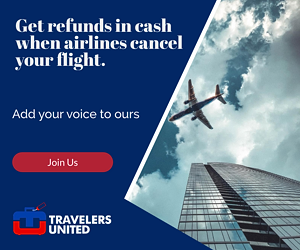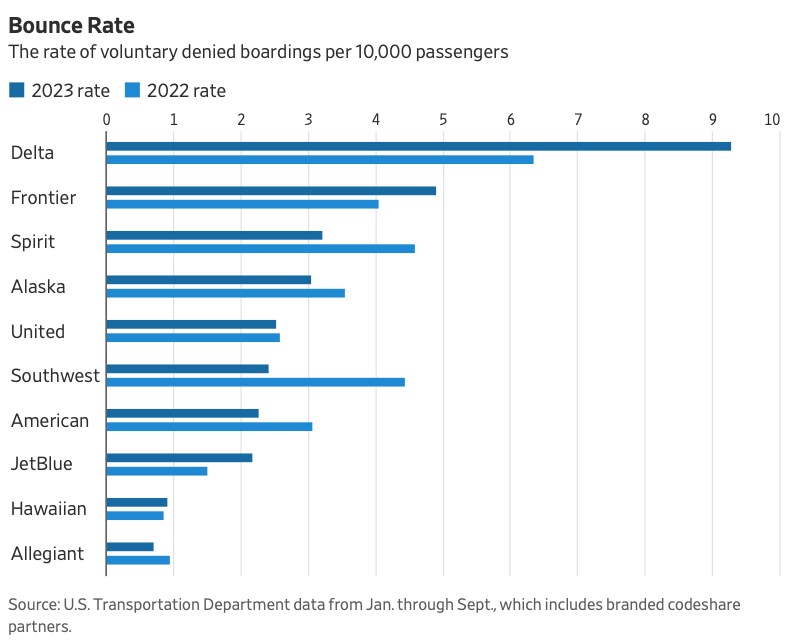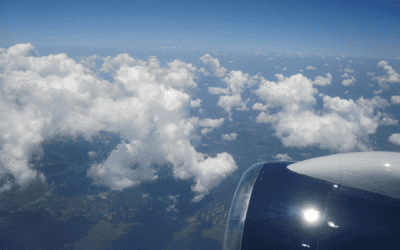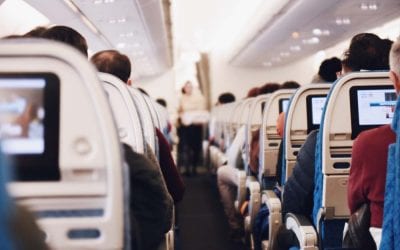Since the pandemic, overall involuntary bumping has dropped more than 77 percent. The airlines are far more astute at denied boarding compensation.
The airlines by law are required to pay passengers $1,550 denied boarding compensation. Some airlines have allowed gate agents to offer as much as $10,000 so that they “volunteer” to get off the plane. But since the 2017 Dr. Dao incident/United Airlines I don’t even need one hand to count $10,000 compensations. Sometimes passengers can get $2,000.
The airlines, especially Delta Air Lines, have either decided that higher normal compensation is far better than involuntarily bumped passengers. That airline calls for volunteers far more than any other airline that finds itself overbooking. Or, Delta Air Lines and other airlines have better analyzed denied boarding. Some airlines have stopped overbooking altogether.
Southwest Airlines has stopped the practice of overbooking and only bumps about half as many travelers in those situations. The denied boarding that takes place is normally because of aircraft weight or changes in type of planes being used.
The new denied boarding compensation systems have reduced bumping for many frequent fliers.
Last December, the Wall Street Journal noted that you should never stop negotiations when dealing with denied boarding.
Fliers who have successfully navigated these situations say it rarely makes sense to take the first offer. The longer you wait, the better the airline’s offer will be. Just don’t take too long — offers can vanish quickly.
Once you’ve accepted, don’t stop negotiating. You can negotiate for additional upgrades or food, meal and hotel vouchers by asking the gate agent what else they can offer.

I remember years ago, when returning from Thanksgiving, I scored four denied boarding chits, each for a free flight on Delta Air Lines. I ended up receiving all four coupons for one flight after another. Each time, I volunteered.
On each free flight I was upgraded to first class. I was shuttling between Boston and Charleston, SC, so it was easy to use the tickets for flights. Today, that would be impossible. The apps that are used when boarding are far stingier than they used to be. Recently, I have rarely been called.
I always looked at these flight coupons as free money. For the airlines and routes I fly I rarely get free money.
Operational challenges lead the reasons that passengers are bumped — not overbooking.
As I have already mentioned, Southwest Airlines has basically eliminated overbooking for passenger bumping. The same is true for American, United, Alaska, JetBlue, and LCCs. Both Frontier and Spirit seem to have more overbookings than other airlines. Many of the bumping issues are the result of switching to smaller aircraft in order to reduce the weather and air traffic delays.
The Department of Transportation (DOT) has specific rules for overbooking and denied boarding.
These can be found easily by searching on the Internet.
Situations when bumped passengers ARE eligible for compensation:
If you are not bumped from a flight for one of the reasons above, you qualify for involuntary denied boarding compensation if an airline requires you to give up your seat on an oversold flight and:
- Passenger has a confirmed reservation,
- Passenger checked in to their flight on time,
- You arrived at the departure gate on time, and
- The airline cannot get you to your destination within one hour of your flight’s original arrival time.
If I am entitled to compensation, how is the amount of compensation calculated?
- Passengers who are denied boarding involuntarily due to oversales are entitled to compensation that is based on the price of their ticket, the length of time that they are delayed in getting to their destination because of being denied boarding, and whether their flight is a domestic flight or an international flight leaving from the United States. This is called “denied boarding compensation” or “DBC” for short.
- Most bumped passengers who experience short delays on flights will receive compensation equal to double the one-way price of the flight they were bumped from, but airlines may limit this amount to up to $775. Passengers experiencing longer delays on flights will receive payments of four times the one-way value of the flight they were bumped from, but airlines may limit this amount to up to $1,550. Please see the tables below.
Domestic – Denied Boarding Compensation (DBC)
Length of Delay Compensation 0 to 1 hour arrival delay No compensation 1 to 2 hour arrival delay 200% of one-way fare (airlines may limit the compensation to $775 if 200% of the one-way fare is higher than $775) Over 2 hour arrival delay 400% of one-way fare (airlines may limit the compensation to $1,550 if 400% of the one-way fare is higher than $1,550) International – Denied Boarding Compensation (DBC)
Length of Delay Compensation 0 to 1 hour arrival delay No compensation 1 to 4 hour arrival delay 200% of one-way fare (airlines may limit the compensation to $775 if 200% of the one-way fare is higher than $775) Over 4 hour arrival delay 400% of one-way fare (airlines may limit the compensation to $1,550 if 400% of the one-way fare is higher than $1,550) When will I receive compensation if I am eligible to receive it?
- Following a bumping incident, airlines must offer passengers compensation at the airport on the same day.
- If the airline provides substitute transportation that leaves the airport before the airline can pay the passenger, the airline must pay the passenger within 24 hours of the bumping incident.
Is there is a limit on how much money airlines are allowed to give me when I am involuntarily bumped?
-
No. Although airlines are required to give you a certain amount of money by law, airlines are free to give you more money than is required if they want to.
READ ALSO:
Resolve to use these 21 cybersecurity actions immediately
Use international phone plans when traveling globally — or suffer bill shock

Charlie Leocha is the President of Travelers United. He has been working in Washington, DC, for the past 14 years with Congress, the Department of Transportation, and industry stakeholders on travel issues. He was the first consumer representative to the Advisory Committee for Aviation Consumer Protections appointed by the Secretary of Transportation from 2012 through 2018.





